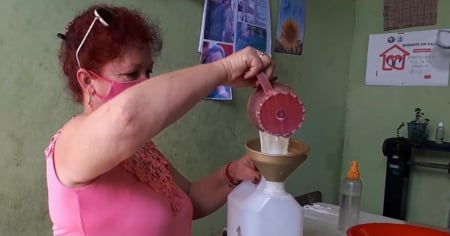The milk crisis in Cuba continues to hit Cuban families hard, and now, more than 4,380 children in Guantánamo face a drastic measure: they will receive only one liter of milk every three days. This distribution, carried out directly in 177 bodegas, highlights the severity of the shortage of basic food items on the island.
The measure, which primarily affects children aged 2 to 6 years, was adopted by local authorities as a "solution" to the shortage of powdered milk, a product that has become an unattainable luxury for many families. Children under 2 years old and those on special medical diets receive additional care, but the situation is also critical for them.
"It's a feeling of complete helplessness; the children need milk every day, and now I have to figure out what to give them for breakfast," says a visibly distressed mother from Guantánamo. "What they provide me isn't enough at all, and the price of milk on the street is sky-high."
The distribution of milk has become a headache for local authorities, who claim that delays in receiving supplies are due to external restrictions that hinder their financing and procurement. However, these explanations do little to ease parents' concerns or the hunger of children.
On December 6 and 8, authorities reported that Guantanamo received enough milk to support 10 days of consumption for children aged 0 to 2 years and those on special medical diets. However, the situation is different for others. In the provincial capital and in the municipality of Caimanera, a liter of liquid milk is provided every three days for over 10,500 children aged 2 to 6 years, while in the remaining municipalities, the number of affected children rises to 4,380.
Milk is distributed directly to 177 warehouses, an operation that the authorities claim is "controlled" to prevent diversions or irregularities, although no information has been provided on how transparency in this process will be ensured. This fragmented distribution, which is already inadequate, exacerbates child nutrition amid the profound economic crisis currently facing the country.
Provincial authorities have stated that they are conducting "daily analyses" with municipalities to enhance the contributions from local producers of cow, goat, and buffalo milk, aiming to protect children aged 2 to 6 years. However, this measure has not succeeded in alleviating the growing demand.
The impact of this situation is significant. Milk is an essential source of nutrients for young children, and its absence can have negative effects on their physical and cognitive development. "Milk is vital at this stage of life. Its lack can lead to growth problems, calcium deficiency, and anemia," warned a pediatrician who preferred to remain anonymous.
In the midst of this crisis, Cuban families are turning to the informal market, where the price of a kilogram of powdered milk far exceeds the income of an average worker. "You have to choose between buying milk or buying food, because there isn't enough for everything," says a grandmother who takes care of her three grandchildren.
The Minister of Food Industry, Alberto López Díaz, recently acknowledged that the government is unable to supply the amounts of milk stipulated in the regulated family basket due to failures in meeting production targets. He added that the energy crisis and frequent power outages impact the production chain, causing the collected milk to sour because "the thermos has no power."
In light of this reality, parents and caregivers continue to seek alternatives to feed their children, while uncertainty grows day by day. Cuban children, who should have guaranteed access to basic food supplies, now rely on a local store to hopefully receive a liter of milk every three days. This situation highlights the precarious living conditions faced by much of the Cuban population and underscores the urgent need for effective solutions from the government.
Filed under:
